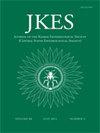Fitness and Predating Potential of Antilochus coquebertii (Hemiptera: Pyrrhocoridae): A Predator of the Red Cotton Bug (Dysdercus koenigii)
IF 0.3
4区 农林科学
Q4 ENTOMOLOGY
引用次数: 3
Abstract
ABSTRACT: Antilochus coquebertii is one of the most important predators of Dysdercus koenigii. The present study examines for the first time the fitness (using age-stage and two-sex life table parameters), morphometrics and predating potential of A. coquebertii fed on the second instar of D. koenigii under laboratory conditions. Results indicate that female adults of A. coquebertii consumed significantly higher numbers of second instar D. koenigii (229.81 ± 14.36) when compared to male adults (118.47 ± 10.77). The body length (16.10±0.40 mm) and width (6.60 ± 0.20 mm) of female adults of A. coquebertii were significantly higher if compared to body length (14.40 ± 0.40 mm) and width (5.80 ± 0.40 mm) of male adults. The developmental period of A. coquebertii from egg to female adult (76.09 ± 3.51 days) was significantly longer than egg to male adult (64.00 ± 1.87 days). The fecundity (number of eggs/female) of A. coquebertii was 108.67 ± 3.67 per female. The intrinsic rate of increase (r) and finite rate of increase (λ) per day of A. coquebertii were recorded with values of 5.87 and 1.06 days, respectively. The gross reproductive rate (GRR) and net reproductive rate (R0) of A. coquebertii were 23.17 offspring and 18.56 offspring/individual, respectively. The information obtained in this study will be useful for the development of future research projects focused on this predator against D. koenigii under natural conditions. Based on our results, we suggest that A. coquebertii will be a good biological control agent against the second instar of D. koenigii in cotton fields.coquebertiantilochus coquebertii(半翅目:恙螨科):红棉虫的捕食者的适应性和捕食潜力
摘要:coqueberantilochus是koenigii Dysdercus的主要捕食者之一。本研究首次在实验室条件下,利用年龄阶段和两性生命表参数,研究了coquebertii对koenigii二龄虫的适应性、形态计量学和预食潜力。结果表明,雌成虫对二龄柯尼氏夜蛾的摄取量为229.81±14.36只,雄成虫为118.47±10.77只;雌成虫体长(16.10±0.40 mm)和体宽(6.60±0.20 mm)显著高于雄成虫体长(14.40±0.40 mm)和体宽(5.80±0.40 mm)。coquebertii从卵到雌成虫的发育周期(76.09±3.51 d)显著长于卵到雄成虫的发育周期(64.00±1.87 d)。coquebertii的繁殖力(卵数/雌)为108.67±3.67个。coquebertii的内在增长率(r)和有限增长率(λ)分别为5.87和1.06 d。coquebertii的总繁殖率(GRR)为23.17个,净繁殖率(R0)为18.56个。本研究为今后开展自然条件下对柯尼氏夜蛾捕食者的研究奠定了基础。综上所述,coquebertii是棉田科尼氏二龄螟较好的生物防治剂。
本文章由计算机程序翻译,如有差异,请以英文原文为准。
求助全文
约1分钟内获得全文
求助全文
来源期刊
CiteScore
1.60
自引率
0.00%
发文量
12
审稿时长
>12 weeks
期刊介绍:
The Journal of the Kansas Entomological Society is a publication of the Kansas (Central States) Entomological Society, publishes research on all aspects of the sciences of entomology, and has world-wide authorship and readership.

 求助内容:
求助内容: 应助结果提醒方式:
应助结果提醒方式:


